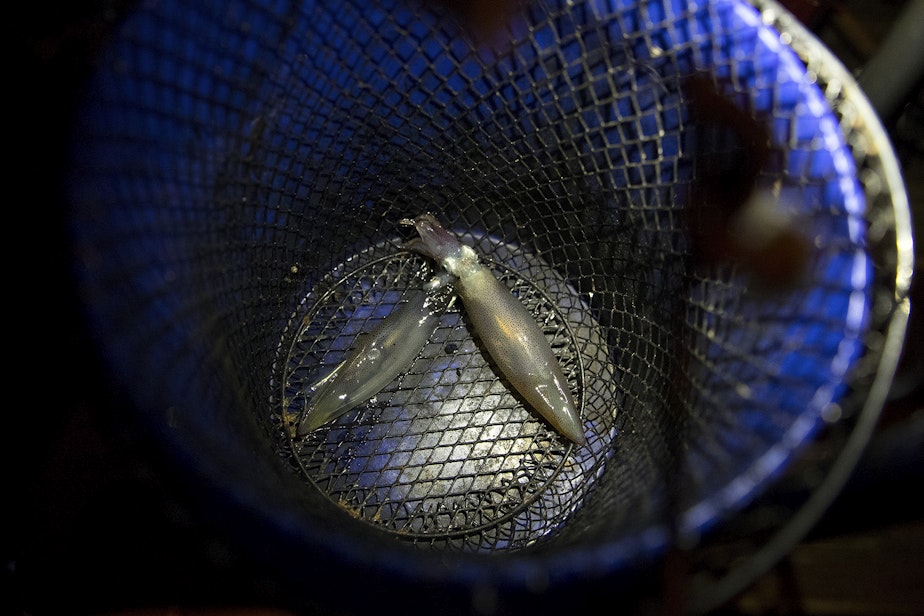The secret life of Seattle's squidders
On Friday afternoon, most Seattleites might be thinking about going out for happy hour after work.
But not everybody.
A few hardy folks will brave the elements to fish for squid.
Squid come out to feed at night and are attracted to lights. You don’t need special gear or a boat to catch squid. Just a fishing pole, a bright light, and some squid jig to lure them.
I went to a popular squidding spot in West Seattle recently to see what the attraction is all about.
Most fishermen are protective of their turf. The squidders I met were no different.
“You’re not going to get anyone to talk to you,” said squidder and retiree Tom Brophy. He had just staked out his spot on the pier.
“Once this gets out, we’ll have 10,000 people here the next day, I’m not kidding you.”
Sponsored
It had not yet gotten dark yet, but the dock was already filled with men standing shoulder to shoulder.
Brophy said squidding is a good winter activity that doesn’t require special training or knowledge. And you get better at it the more you practice.
Brophy's fishing friend Steve Rains explained the first rule in squidding: “You got to throw it in a special way so you don’t tangle your neighbor,” he said. “Otherwise, you’re dog meat.”

Sponsored
Rains discovered squidding decades ago when he used to fish for herring to use as bait. He was intrigued when he saw other guys fish for squid. He gave it a try and has been squidding ever since.
There’s a lot of good-natured ribbing as the men settle in. But as soon as the sun sets, and darkness fades in, the pier quiets down. All you hear are the soft splashes from fishing lines dropping and the occasional sea lions barking in the background.
Squid are abundant in the Puget Sound. They’re native to the West Coast.
“These guys are always on the move throughout their short lives,” said Chris Eardley, Puget Sound shellfish policy coordinator with the state Fish and Wildlife Department in Port Townsend.

Sponsored
Squid spend their short adult lives in coastal waters and, like salmon, return to the Puget Sound to spawn.
Moving around a lot and a short lifespan makes them safe to eat, Eardley said. "They’re probably not a big concern for accumulation of toxins like heavy metals, for example."
And squidding is quietly becoming a popular winter activity in Washington, Eardley said.
Back at the pier in West Seattle, Kelvin Kong said there’s a big difference between fresh and frozen squid. “Oh yeah, it’s a night and day difference. It’s a lot more tender.”
Sponsored

Kong started squidding three years ago because he likes the fishing part. The catch, he says, is a bonus. His tip for beginners?
“Watch what the veterans do,” he said. “If the squid comes in, anyone can catch a squid.”
Suddenly, a commotion on the other end of the dock. Tom Brophy pointed to the bucket, his first catch of the night.
Sponsored
“See the color it is?" Brophy asked. "In a few minutes it’ll be white, to match the bucket."
The squid is dark gray, about the length of a business card. Brophy explained that squid have a built-in mechanism that allows them to change color.
Brophy is one of the lucky ones. Others still had empty buckets. It didn't help that a boat came by and lingered across from the pier. The squidders yelled at them — they didn't want a distraction for the squid, or their squidding.
KUOW Reporter David Hyde contributed to this story.




